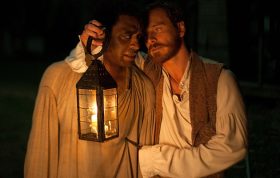

I remember back in college there was a very specific and animated discussion going on about art. “What is art?” was the topic—naturally, it being college, the question was an unanswerable one, designed to prompt the most philosophical and thought-and-conversation-provoking responses. There was one response I remember quite distinctly: “I don’t care what it is, just make it honest.”
When you really think about that, there’s so much to it and yet, it’s so simple. But, when it comes to narrative film-making, honesty in art is a rare commodity. So let’s be, well, honest—if you want honest filmmaking, you should probably be watching documentaries (and, rumor has it, sometimes blurred lines exist there as well). But there are some filmmakers who choose to run towards the more honest side of narrative (i.e. fictional) filmmaking, or at least try to. I consider Steve McQueen to be one of these directors. At least in my mind’s eye, when I look at his relatively small body of work—the Irish hunger strike drama Hunger, the sex addiction drama Shame and the just-released slavery drama 12 Years a Slave—I see a man wanting to tell three very different stories. But not just stories—these movies are deep explorations of humanity, in all its darkness and truth. You know how James Cameron took that deep sea submersible down to find the Titanic? I imagine Steve McQueen in his own little metaphorical deep-diving submersible, delving deep into the human psyche—sort of like Dennis Quaid inside Martin Short in Innerspace, but in a much more dark, twisted and psychologically devastating way.
Why Steve McQueen movies are good is not difficult to answer. He is an amazing filmmaker, technically gifted, he has an incredible eye, he does things with the camera that are refreshing and exciting to watch—he has become famous for long takes that define each film—and he gets absolutely astonishing performances from his actors, who seem willing to do anything for him. Especially noteworthy is his muse, actor Michael Fassbender, who has starred in all three of his films. Fassbender and McQueen have a connection that brings out the best in both of them—like Scorsese and De Niro in their early years, when a director and actor have that sort of artistic communion, you don’t question it, you just sit back and appreciate the gifts that come your way.
Why Steve McQueen movies are compelling is another matter. They’re either your cup of tea or they’re not. If you like your Hollywood movies sugar-coated and happy-ended, Steve McQueen isn’t your director. But, again, if you like to get down and dirty, into the nitty gritty of characters, in all their frailties and traumas and obsessions, then McQueen is the one for you. He is a director who recognizes that life is about influences, motivations and choices and how we, as humans, navigate through them as we go through life and how we face and deal with mistakes we inevitably make along the way. What I also love about McQueen is the recognition that there are sides of the human psyche that are dark and twisted and obsessed that have nothing to do with murder or killing. What a concept: movies that explore the vagaries and dark recesses of humanity and not a serial killer in sight. How refreshing.
Still, you really have to be cut out for this sort of “entertainment.” Which brings us to McQueen’s current movie, 12 Years a Slave. This is a hard movie to watch. It’s not hard to prepare you for it because it’s based on history and a true story, that of Solomon Northup, a free black man in the 1800s, living in New York, who is kidnapped and taken down to New Orleans, where he is sold into slavery. The movie is a brutally honest depiction of slavery in the American South, probably the most brutal one I’ve seen. Similar in its violence to last year’s Django Unchained but harder to watch because the violence is not masked by fantasy or camp elements. This is in-your-face brutal reality and it is not for the squeamish or sensitive. But beyond the physical tortures are the emotional ones—being ripped from your family and your freedom, this very personal story of a man who has everything taken away from him is devastating to watch, almost unbearable.
And yet this film is beautiful. The direction is magnificent and the performances throughout this film are staggering, particularly Chiwetel Ejiofor, Michael Fassbender and Lupita Nyong’o, all of whom will most likely get well-deserved Oscar nominations. It is a very powerful and important film, well done in every way. It is a story that demanded to be told, demanded to be heard and it is absolutely perfectly done and deserves to be seen.
But I have no idea how to recommend it. This is a hard watch. There is a scene in this film, for example, during which at least 4 different people left the theatre I was in and the man next to us—who was under 40, by the way—was loudly sobbing, literally gasping for air he was crying so hard. I have never seen anything like it.
But, if you know what it is, if you are prepared and if you know yourself and you appreciate deep, dark and meaty dramas with historical significance that just may illuminate a piece of who we are, as a people and as a species, you will be rewarded, because 12 Years a Slave is as rich and honest a film as they come.
And you just might call it art.
